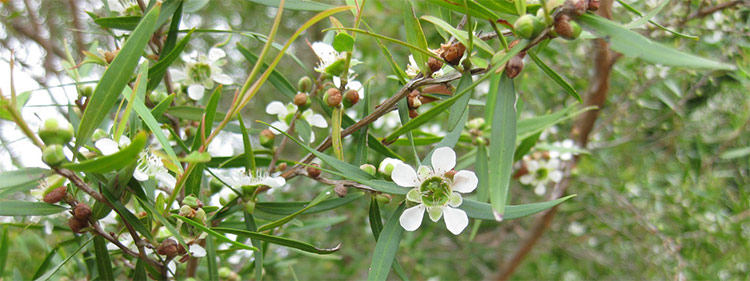Lemon Tea Tree Essential Oil
Leptospermum petersonii

Photo Credit: Gardenology.org IMG 2706 rbgs11jan.jpg by Raffi Kojian. Cropped image. Licensed under CC BY-SA 3.0
Description
Lemon Tea Tree Essential Oil is abundant in aldehydes, particularly citral (geranial and neral). As such, it is anti-microbial, possesses an intensely lemony aroma and is great for use in diffuser blends and for use in household cleaning formulations. It is a wonderful choice for use in helping to combat odors.

Within skin care, it can be helpful for those that have oily skin when used very sparingly. Citral can greatly increase the risk of skin sensitization. Topically, therefore, Lemon Tea Tree Essential Oil needs to be used in very low dilution. Read the Safety Information section below for details.
Aromatically, Lemon Tea Tree smells even more lemony than Lemon Essential Oil. Despite it's common name, it does not possess the strongly medicinal aroma that common Tea Tree Essential Oil has. It's a beautiful, crisp, citrusy oil that blends well with essential oils in the citrus, wood, floral, camphorous, and mint families.
For emotional applications, Lemon Tea Tree Essential Oil is an uplifting, stimulating oil. When used in low dilutions, it can simultaneously help to calm fragile nerves and help with anxiety.
Lemon Tea Tree Essential Oil Benefits and Uses
- Household Cleaning
- Anti-bacterial Applications
- Oily Skin
- Odors
- Insect Repellent
- Anxiety
- Stress
Botanical Name
Plant Family
Common Method of Extraction
Steam Distilled
Plant Part Typically Used
Color
Clear
Consistency
Thin
Perfumery Note
Top
Strength of Initial Aroma
Medium - Strong
Aromatic Description
Lemon Tea Tree Essential Oil smells intensely lemony and citrusy.
Sustainability and Conservation Status
Least Concern
Source: https://www.iucnredlist.org/species/192227122/192227124
To learn more about the conservation status of essential oil bearing plants and how to use the IUCN Red List of Threatened Species, please refer to AromaWeb's Guide to Essential Oils and Sustainability.
Major Constituents
Geranial
Neral
a-Pinene
Citronellal
Geraniol
Isopulegol
Linalool
Spathulenol
[J.J. Brophy, R.J. Goldsack, A. Punruckvong, et al. Leaf Essential Oils of the Genus Leptospermum (Myrtaceae) in Eastern Australia. Part 7. Leptospermum petersonii, L. liversidgei and Allies. (Flavour & Fragrance Journal 15, 2000), 342-351. Source cited in Robert Tisserand and Rodney Young, Essential Oil Safety (Second Edition. United Kingdom: Churchill Livingstone Elsevier, 2014), 446.]
Lemon Tea Tree Essential Oil Safety Information
Tisserand and Young caution that a drug interaction may occur if using drugs metabolized by CYP2B6 and that there is a risk of teratogenicity. They precaution against topical use in children and infants under age 2 and for those with hypersensitive/diseased/damaged skin. They recommend a dermal maximum of 0.8%. Reading Tisserand and Young's full profile is recommended. [Robert Tisserand and Rodney Young, Essential Oil Safety (Second Edition. United Kingdom: Churchill Livingstone Elsevier, 2014), 446-447.]
General Safety Information
Do not take any oils internally and do not apply undiluted essential oils, absolutes, CO2s or other concentrated essences onto the skin without advanced essential oil knowledge or consultation from a qualified aromatherapy practitioner. For general dilution information, read AromaWeb's Guide to Diluting Essential Oils. If you are pregnant, epileptic, have liver damage, have cancer, or have any other medical problem, use oils only under the proper guidance of a qualified aromatherapy practitioner. Use extreme caution when using oils with children and be sure to first read the recommended dilution ratios for children. Consult a qualified aromatherapy practitioner before using oils with children, the elderly, if you have medical issues or are taking medications. Before using this or any essential oil, carefully read AromaWeb's Essential Oil Safety Information page. For in-depth information on oil safety issues, read Essential Oil Safety by Robert Tisserand and Rodney Young.
Shelf Life
Important Information About the Profiles
The essential oil information provided on AromaWeb is intended for basic educational purposes only. The references to safety information, test results, constituents and percentages is generalized information. Essential oils can vary greatly in composition. The data is not necessary complete and is not guaranteed to be accurate. The essential oil photos are intended to represent the typical and approximate color of each essential oil. However, essential oil composition and color can vary based on harvesting, distillation, age of the essential oil and other factors. Profiles for several CO2 Extracts and absolutes are included within the directory, and are denoted as such.
